The Communist Party of the Russian Federation’s second-place finish in preliminary results for Russia’s September 17-19 parliamentary and regional elections speaks less to the effectiveness of Smart Voting and more to Russian voters’ growing desire for a party that emphasizes social-welfare concerns, some Russian analysts believe.
But, either way, Russia’s modern-day Communist Party, heir to the Soviet Union’s ruling Communist Party, is no party of revolution that the Kremlin will fear, they caution.
Headed by 77-year-old Gennady Zyuganov since its founding in 1993, the party, known in Russian as the KPRF, received nearly 19 percent of the party-list vote for the Duma, almost 6-percentage points higher than its 2016 finish. With 99 percent of the vote counted, it had received nine seats based on first-past-the-post races.
The Kremlin-backed United Russia, by contrast, sank by roughly 6-percentage points on the party-list vote to just under 50 percent of the 250 party-determined Duma seats, but picked up 198 individual-mandate seats, according to preliminary Central Election Commission data.
Overall, that gave United Russia 51 percent of the parliamentary vote. Its sometime political allies, the LDPR and A Just Russia, along with the youth-oriented New People party also crossed the 5-percent threshold to gain seats in the 450-member Duma.
Russian political analysts believe that voting recommendations from the team of jailed opposition leader Aleksei Navalny may have contributed to the Communist Party’s results, its best in decades, but do not explain the increase entirely.
The Smart Voting app recommended 137 Communist candidates as most likely to defeat the ruling United Russia party in Duma and regional races, but was largely banned within Russia as the work of an “extremist” movement or as tech companies blocked its content.
“It will be very difficult to allot a share of the Communists’ victory to Navalny’s technology,” commented political analyst Andrei Kolesnikov of the Carnegie Moscow think-tank. Conceding that Smart Voting contributed to “some part” of it, Kolesnikov urged against being “in an echo chamber, where it seems to us like everyone around us is using Smart Voting, and that this really influences the results.”
No methodology exists to quantify within a reasonable doubt Smart Voting’s actual impact, political scientist Aleksandr Kynev cautioned RFE/RL’s Russian Service during Current Time’s September 19 elections special.
Nonetheless, believes independent political analyst Dmitry Oreshkin, “The Communists didn’t profit badly from Smart Voting.”
If so, their public thanks have not been profuse. Though many KPRF members have demonstrated for Navalny’s release from jail, Zyuganov, like President Vladimir Putin, sees the 45-year-old Navalny as the marionette of Western powers.
“Today, the smartest voting is for the Communist Party and the left-patriotic bloc,” he commented to Radio Komsomolskaya Pravda on September 15.
The party, described as Russia’s largest opposition grouping, has rejected preliminary results from online voting in Moscow, where United Russia pulled ahead of it by more than a 14-percentage-point margin (36.98 percent to 22.68 percent) overall, according to the latest official data.
Online voting results eliminated tentative Communist Party wins in 15 of Moscow's electoral districts, Reuters reported. United Russia appears to have retained its control in nine gubernatorial races and 39 regional parliaments.
On Twitter, Zyuganov hinted at the possibility of “massive protests” over election violations he deemed the work of the entire electoral system. (Central Election Commission Chairwoman Ella Pamfilova has denied any rampant irregularities.) Though Moscow City Hall rejected the KPRF’s request to hold three days of demonstrations in Moscow over the election results, the party staged a protest of around 200 people in downtown Pushkin Square the evening of September 20.
Both Oreshkin and Kolesnikov, however, scoffed at the notion of the KPRF as an opposition party that would push hard against the Kremlin.
Zyuganov, noted Oreshkin, “suits the Kremlin” since “he’s calm, the age of a pensioner,” and a political figure they know how to handle. Zyuganov’s political pinnacle has been described as 1996, when he finished a close second to Boris Yeltsin in Russia’s presidential elections.
Today, the Communists may express their “polite opposition” to the Kremlin, but “on key issues they’ll vote as they should, [according to the Kremlin], and I don’t think there’s any doubt about this,” said Oreshkin, who deems the Duma “a decorative organ.”
Even with a larger Duma faction (57 members, tentatively) than its outgoing 43-member faction, “Zyuganov will just have to work more so that this faction doesn’t get out from under the Kremlin’s control,” said Kolesnikov. “In this sense, of course, nothing will change.”
Where relations may “escalate,” added Oreshkin, is within the KPRF itself, if a younger generation of members grows eager to break with the Soviet-era Zyuganov.
One rising KPRF celebrity is 36-year-old Nikolai Bondarenko, a regional legislative deputy who hosts a YouTube blog, The Deputy’s Diary (Dnevnik Deputata), with 1.64 million subscribers. Sometimes referred to as the “Red Navalny,” the combative Bondarenko, who views Navalny as a political prisoner, gained particular public notice in 2018 after attempting to live for a month on Russia’s minimum monthly wage of 3,200 rubles ($52), a policy he called akin to “genocide.”
Known for its promotion of a robust welfare state (and, lately, its antipathy to required COVID-19 vaccination), the KPRF has seen its support among voters under 40 increase in recent years as they contend with a sanctions and pandemic-hit economy, political observers have noted.
Many of these new supporters are nostalgic for a Soviet Union they themselves never experienced.
To the state-run TV news broadcaster RT, however, such nostalgia is part of the reason why United Russia still commands the country’s political field.
If so, Russia could be in store for more years with the ruling United Russia, despite its weakening election returns.
“Elections in Russia are, above all, a vote for the authorities, and, in this case, this model was confirmed,” commented Kolesnikov.
-With additional reporting from Interfax, Reuters, RIA Novosti, and TASS
The party’s preliminary finish in the Far East, where it beat United Russia by TK, may be surprising given the region’s residents’ past, and could indicate that it will grab momentum in central Russia.




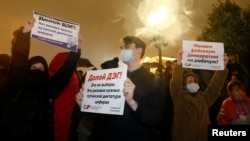
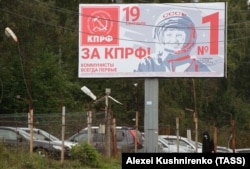


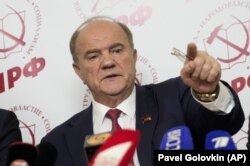
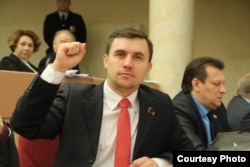
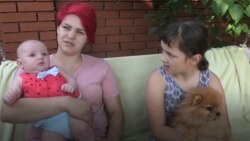
Facebook Forum